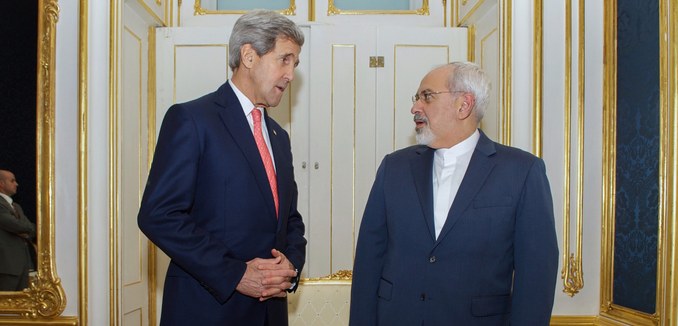Top lawmakers, military analysts, and media outlets are broadly suggesting that coziness between the Obama administration and Iranian officials will weaken the details and enforcement of whatever nuclear deal emerges from the negotiations in Vienna, Austria. Concerns began to openly surface as the latest talks commenced, with both the Associated Press (AP) and The Wall Street Journal publishing extensive exposés on efforts by the White House to achieve and lock in rapprochement with the Iranians, despite much-repeated claims from the administration that it was not trying to boost the Iranian regime.
The AP outlined a marked shift in Washington’s approach to Tehran, culminating in coziness despite ongoing Iranian efforts to undermine American influence geostrategically and ongoing displays of hostility toward the United States – including regular chants of “Death to America” – led by top Iranian figures:
Just a short while ago, a snapshot alone of these two enemies engaged in discussions on nuclear and other matters would have been a bombshell felt in capitals around the world. Now, whether or not the U.S. and its negotiating powers can clinch a pact in Austria’s capital over the next several days, it’s hard to imagine the tentative U.S.-Iranian rapprochement ending anytime soon. It’s become the new normal.
The Journal subsequently revealed (Google link) that the Obama administration had begun seeking reconciliation with the Iranians from the start of President Obama’s first term. Part of those efforts included releasing Iranian arms dealers and aligning against organizations that the Iranians considered hostile.
Iran secretly passed to the White House beginning in late 2009 the names of prisoners it wanted released from U.S. custody, part of a wish list to test President Barack Obama’s commitment to improving ties and a move that set off years of clandestine dispatches that helped open the door to nuclear negotiations. The secret messages… included a request to blacklist opposition groups hostile to Iran and increase U.S. visas for Iranian students, according to officials familiar with the matter. The U.S. eventually acceded to some of the requests… With a deal in sight, some worry the U.S. will give up too much without getting significant concessions in return. The Obama administration initially called for an end to Tehran’s nuclear fuel production, a dismantling of many of its facilities and a rollback of its missile program—goals that have been dropped… Over the past six years, U.S. allies in the Mideast say, Iran has expanded its influence in Syria, Iraq and Yemen. Now, they say, Tehran is set to maintain much of its nuclear infrastructure, while scoring an economic windfall.
This dynamic threatens to trigger a political backlash in Congress. Lawmakers on both sides of the aisle have been vocal in demanding that the administration take a tougher line with the Iranians and have criticized U.S. negotiators for failing to do so.
Ed Royce (R-Calif.), Chairman of the House Foreign Affairs Committee, has recently compared the emerging deal to that forged with North Korea in 1994, under which the North Koreans eventually went nuclear. Chairman Royce’s comments came a few days after former CIA Director Michael Hayden declared in an interview on Fox News Sunday that he fears that Iran has the “upper hand right now.” Last week Rep. Ted Deutch (D – Fla.) said that the United States should “turn up the pressure” on Iran.
U.S.-Iranian coziness is also likely to have geopolitical and diplomatic ramifications. Washington’s traditional Arab and Israeli allies are both known to fear the consequences of an agreement, including a likely $150 billion financial windfall that the Iranians could channel toward their military infrastructure. Leaders of the Gulf states already see Iran “virtually controlling Lebanon, Syria, Iraq, and Yemen, and grasping for power almost everywhere else,” according to Jon Alterman, Senior Vice President and Director of the Middle East Program at the Center for Strategic and International Studies in Washington.
[Photo: UNVIE U.S. Mission to International Organizations in Vienna / Flickr ]




